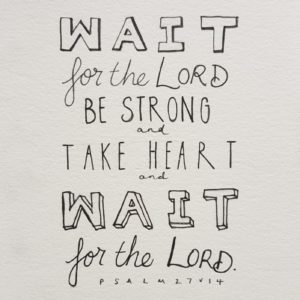Over twenty years ago I spent nine months working in an orphanage in Mozambique. While I was there, I became aware of suffering and injustice I had never dreamed could exist, including the personal hardship of many beautiful people I met. I found it very hard to hold on to my faith in a loving God alongside my new experiences. One way I started to hold these two seemingly contradictory things in tension was by writing songs like this one:
Wait on the Lord,
Wait on the Lord.
Be strong and take heart
And wait on the Lord.
Those who hope in the Lord will renew their strength;
They will rise on wings like eagles;
They will run and not grow weary
They will walk and will not be faint
For they are those who wait…
Wait on the Lord,
Wait on the Lord.
Be strong and take heart
And wait on the Lord.
This song combines two pieces of Scripture: Psalm 27:14 with Isaiah 40:31.
Twenty years on, this tune still comes to my head, and I find myself exploring these verses, again in a time when my belief in a good God is challenged by the experiences of my everyday life.
I discovered that the word ‘wait’ in Psalm 27 is from the same Hebrew word which is translated as ‘hope’ in Isaiah 40. It’s the Hebrew word ‘qavah’ (הוָק). It’s meaning includes:
- waiting expectantly
- looking eagerly
- patience
- remaining
It comes originally from a word meaning the tension caused by twisting and stretching a cord. I feel a little like a stretched cord sometimes. Taught and tense, not able to take much more.
The word translated here as ‘for’ (wait for the Lord), is the Hebrew word ‘el’ ־לאֶ, which can mean ‘on’ or ‘to’, and includes the concept of a motion with direction. Rather than a static waiting, this could imply a leaning into the Lord.and the word ‘on’, as in ‘wait on the Lord’, is an active word, suggesting movement. It could be translated ‘turn towards ‘or ‘lean into the Lord’.
‘Be strong’ is a translation of the Hebrew word ‘hazaq’, from the root word ‘chazaq’ meaning:
- to be or grow strong, firm or secure
- to carry out repairs
- to strengthen
- to firmly take hold
- to encourage
- to devote oneself
While the NIV translation I’ve used here says ‘Be strong and take heart’, other translations, notably the New King James Version translates is as ‘and He will strengthen your heart’, which is a bit different, isn’t it? It suggests when I wait patiently, expecting God to be at work, He comes and gives my heart strength.
Another translation says, ‘Let your heart take courage’, as if my heart is gasping for courage like a thirsty person gasps for water, and I need to allow it to take courage.
The English words ‘and He will strengthen’ or ‘be strong’ comes from the Hebrew root word ‘amets’ [553], which means to be both physically and mentally strong, to be stout (ahem! all the sweets!), to be bold, alert and courageous, and to prevail. These are all things we need in this tough season aren’t they?!
This word ‘amets’ is used in Ruth 1:18 when Ruth is telling Naomi, her mother-in-law, that she will go back home with her, leaving her own family in another country. It’s just after Ruth says her memorable, “Where you will go, I will go….” Then it says, “When [Naomi] saw that [Ruth] was determined…” This determination is sometimes something in me which needs strengthening!
Another word in this verse I love, is the word ‘heart’ which is translated from the Hebrew root word ‘leb’, meaning ‘inner person’, or your ‘will / heart / mind’, even your soul. This is the part of me I most need refreshing, as when I am well in myself, all the other things are easier to do. I definitely get strength from being peaceful in myself.
The Isaiah 40:31 verse is a familiar one. The word ‘renew’ is a translation of the Hebrew root word ‘chalaph’ which means ‘change’ and ‘gain new’. The word ‘strength’ is from the Hebrew root word ‘koach’, which literally means ‘small lizard’ (!!!), as well as ‘rest to the weary’, strength, power and efficiency. Yes please! I would love to gain new efficiency! Again, the root to this is to ‘hope / wait in the Lord’.
“They will rise” in Isaiah 40:31 is a fabulous Hebrew word coming from the root word ‘alah’, which means to go up, to ascend or to climb. It can be used about people going up to a high or sacred place, or going ‘up’ to meet others, including in war. It can also be used about animals, vegetation springing up, as well as natural phenomenon or inanimate objects like dew rising up. In each case, there is an expectation of progression, usually of moving into a new, often better state or place. The use of this word in this verse suggests to me that those who wait on the Lord will be in a dynamic place where God is able to take them into new things.
There was a bit of a surprise when I looked at the Hebrew word behind the word for ‘wings’, because as well as wings it means ‘pinions’! It has connotations of strength and power, as, of course, does the use of the an eagle simile.
‘They shall run’ is from the Hebrew word ‘ruts’ (pronounced ‘roots’), meaning speed – to dash or run or carry speedily. When our strength is renewed we can go fast and not ‘grow weary’. This Hebrew word is ‘yaga’ [3021] and means to toil, be weary, to gasp, exhausted and be faint’. However, this is how those who wait on the Lord will not be! Hurrah!!
“They shall walk” is from the Hebrew ‘halak’ [1980] meaning to go, come or walk. Those who wait on the Lord will also work at a steady pace, doing the usual come and going, and not faint. The word for ‘faint’ is the Henrew word ‘yaeph’ [3286] meaning to be weary, faint, extreme exhaustion.
It’s almost as if this is an acknowledgement that a state of weariness and exhaustion are a common experience of humanity, something which hard labour makes almost inevitable. Except for those who hope in the Lord. There’s something about having our inner being refreshed and strengthened by God which counteracts the inevitability of weariness.
There’s a message of hope!
It reminds me of a message Jesus spoke:
“Come to me all who are weary and burdened I will give you rest.” Matthew 11:28
The word ‘weary’ used here is the Greek word ‘kopiontes’ which means physical and mental toil or labour, exhausting labour, being worn out or depleted. This is the same as the Hebrew words we’ve been looking at, isn’t it?
The word burdened is the Greek word ‘pephortismensi [5412] meaning to load, overload or weight down.
And the word ‘rest’ is the Greek word ‘anapauso’, which means rest after a task is completed, intermission from labour, to be refreshed. The word ‘ana’ means up and it intensifies the word ‘pauso’ which means ‘pause’.
“Come to me” Jesus says. Perhaps this is His way of saying ‘Wait on the Lord’.
Having looked at the various meaning behind the English words, we could write our own version of this song, combining the two verses.
Mine might go like this:
Feeling stretched, tight with tension
I wait, expecting God to intervene,
Eagerly, patiently, I choose to lean into God.
Come to me, Jesus said.
So, I come to Him, exhausted, weary, depleted.
As I do this, I know my soul will be strengthened,
My mind and body made bold and alert.
I let my heart take courage like a free-diver gasping for air
By leaning, confidently into my deliverer God.
Everyone who looks eagerly for God to work
will have their power and efficiency renewed.
They will move progressively and powerfully upwards,
Into a new and better place
They will go fast without exhaustion
They will do all the daily coming and going without becoming weary
For they are those who come close to God, expecting Him to meet an renew them.
This is my prayer for myself and for you. (You kind of deserve it just for making it this far through my loooong post!)

